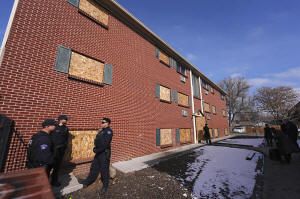|
The lawsuit claims the state and its most populous city, Denver,
have passed “sanctuary laws” violating the Supremacy Clause of
the U.S. Constitution.
“The United States has well-established, preeminent, and
preemptive authority to regulate immigration matters,” according
to the lawsuit, which was filed in federal court in Denver.
There is no strict definition for sanctuary policies or
sanctuary cities, but the terms generally describe limited local
cooperation with Immigration and Customs Enforcement. ICE
enforces U.S. immigration laws nationwide but seeks state and
local help, particularly for large-scale deportations, and
requests that police and sheriffs alert ICE to people it wants
to deport and hold them until federal officers take custody.
The Department of Justice has filed similar lawsuits against
Chicago and Rochester, New York.
Justice Department attorneys argue Colorado's “sanctuary
policies” allowed the Venezuelan gang Tren de Aragua to seize
control of an apartment complex in the Denver suburb of Aurora.
Local officials have called Trump’s claims that the gang had
taken over large swaths of the city exaggerated, but
acknowledged the apartment complex was terrorized, including by
people linked to Tren de Aragua.
Friday’s lawsuit lists as defendants Democratic Gov. Jared
Polis, the state Legislature, Denver Mayor Mike Johnston and
Colorado Attorney General Phil Weiser.
Polis spokesperson Conor Cahill said in an email that Colorado
is not a sanctuary state and regularly works with local, state
and federal law enforcement agencies.
“If the courts say that any Colorado law is not valid then we
will follow the ruling,” he said. “We are not going to comment
on the merits of the lawsuit.”
Republicans in Congress have pressured officials in
Democratic-led cities to cooperate with the Trump
administration’s immigration agenda. Lawmakers summoned the
mayors of Denver, Boston, New York and Chicago to testify last
month before the House Committee on Oversight and Government
Reform.
The mayors pushed back, defending their communities as welcoming
places, not lawless danger zones, and called on Congress to pass
immigration reform.
All contents © copyright 2025 Associated Press. All rights
reserved |
|




